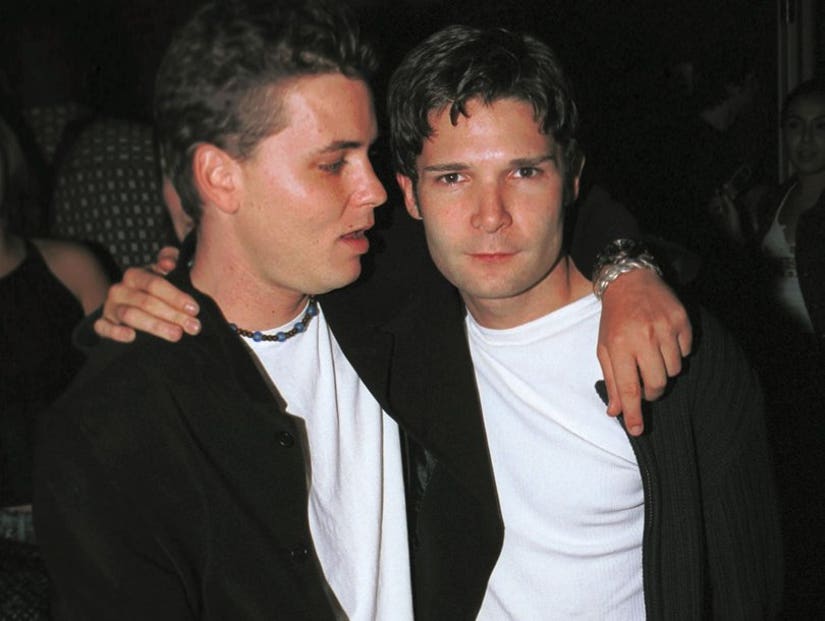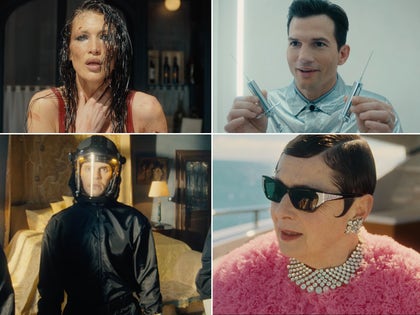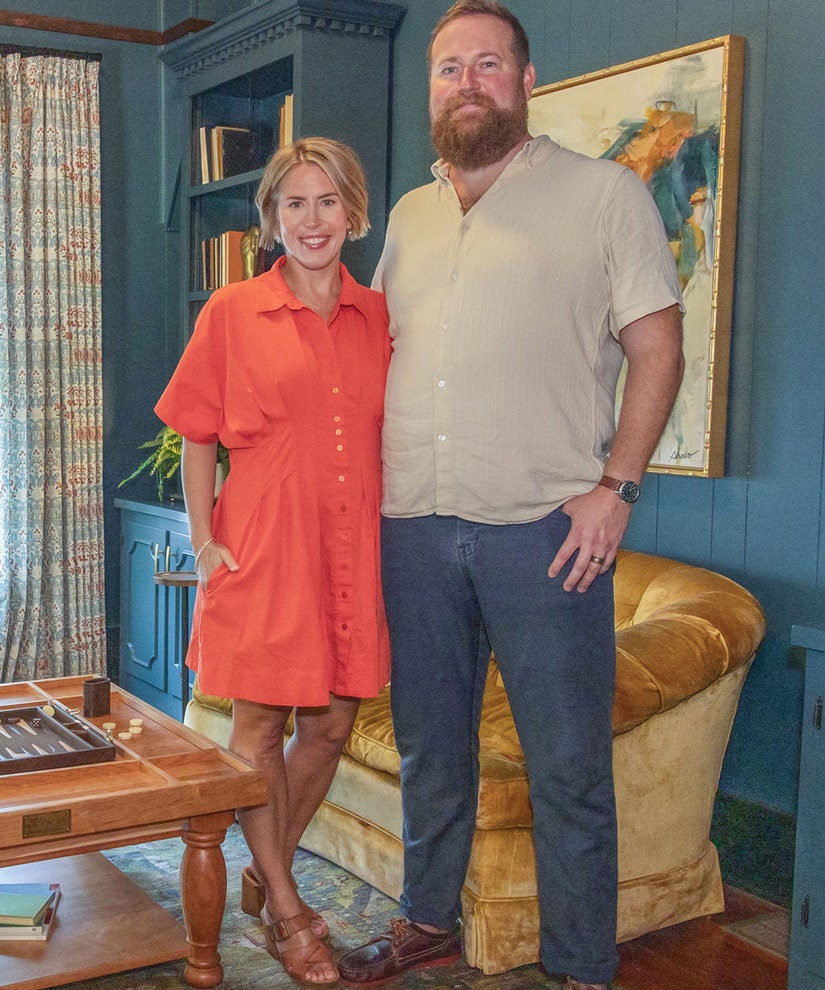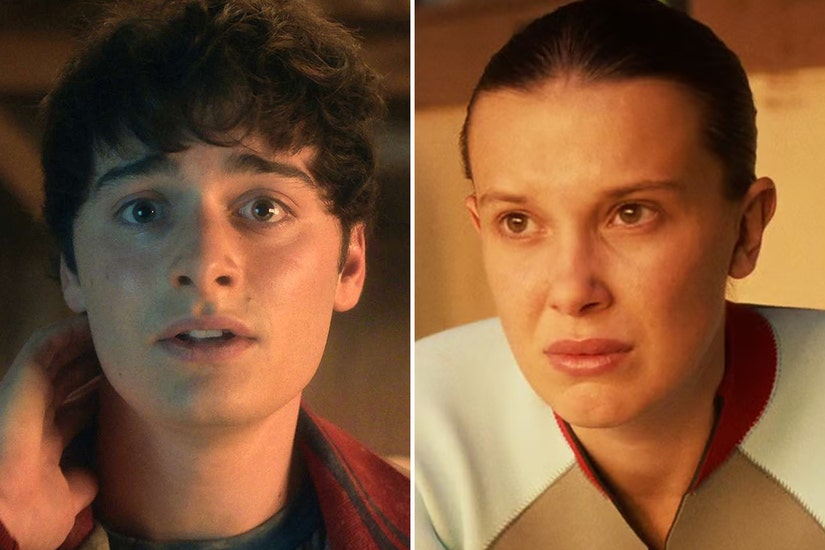There is high-quality entertainment the likes of which will be celebrated Sunday night at the Golden Globes, and then there are Lifetime movies. This year, though, the Globes and Lifetime are both addressing the same serious subject matter in the same weekend, with the network premiering "A Tale of Two Coreys" on Saturday.
The #MeToo movement exploded through Hollywood in 2017, with women and men coming forward with allegations of rampant sexual abuse within the industry. In solidarity and solemnity over the movement, many Hollywood actresses and actors will be wearing black at the Globes ceremony. On the same weekend, Corey Feldman tells his own story of sexual abuse in Hollywood, and that of best friend Corey Haim, through the medium of a Lifetime biopic.
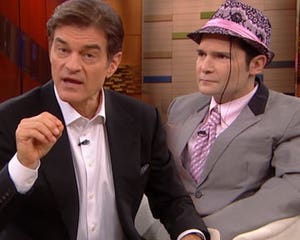 ZoCo Productions, LLC.
ZoCo Productions, LLC.
Corey Feldman Proves on 'Dr. Oz' He Named Hollywood Pedophile in 1993 and Cops Did Nothing
View StoryThe fictionalized account of the rise and fall of the 1980s teen icons bears a stronger claim to legitimacy than most Lifetime biopics, as Feldamn is an executive producer on the film; Haim died in 2010. Unfortunately, it also bears all the hallmarks of a typical low-budget Lifetime film. So it was both deadly serious and awkwardly silly, sometimes at the same time.
Below are the moments we can't stop thinking about, serious and/or silly.
 Getty
Getty
Corey Feldman, Sean Astin Defend Alyssa Milano From Backlash Over Underage Hollywood Sex Abuse
View StoryHaim's Mysterious Rapist
The film didn't shy away from Corey Haim getting sexually assaulted almost immediately at the start of his career, but it did keep the man's face and identity secret. He walked up to Haim on the set of "Lucas," so was he affiliated with that film? We got no answers, but instead awkward camera angles looking down on Haim, and vague glimpses of his hands. He was never mentioned again in the film.
According to Feldman, even years later, Haim was afraid of the man. When Feldman asked Haim why he didn't tell his own story, rather than making Feldman promise to do it, Haim apparently said, "I can't do it. I'm too afraid of him. He will kill me. And if he doesn't kill me, he'll hurt my mom. No matter what, he'll destroy me and I won't be able to survive it. I'm not strong enough."
After the film, Feldman said he still couldn't reveal the man's identity. "The guy that I can't talk about," Feldman said when asked who he was. "Same guy, still around, still popular, still famous, still rich, still powerful." Feldman went on to detail that he always walked around with armed guards after threats on his life and a near-death experience he described as "very much an intent-to-kill situation."
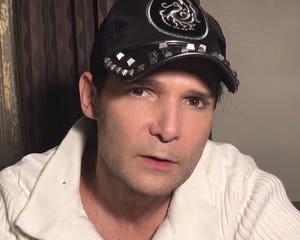 YouTube
YouTube
Corey Feldman Planning Documentary to 'Bring Down' Hollywood Pedophile Ring
View StorySexual Predators Creep Like Sexual Predators
Lifetime films are not known for their subtlety, and that was absolutely the case with the child predators portrayed in the film. Haim's initial rapist was pretty creepy -- plus, we got sinister music when he showed up and the second the door opened to reveal talent manager Marty Weiss as their new "chaperone." Immediately, Weiss awkwardly propositioned Haim, and then Haim just took him up on it as Feldman left in irritation. The whole scene felt rushed and awkward. Let's set the stage.
Haim and Feldman are fighting because all Haim wants to do is hook up with women rather than go over their lines. "Why don't you hook up with Marty so we can get back to work," Feldman shouted.
"I could, if you wanted me to," Marty responded in the film. Just like that? And yes, it's played as deadly serious.
In 2012, Weiss was sentenced to six months jail on multiple charges of child molestation. While it wasn't shown or specifically referenced in the film, in November 2017, Feldman claimed that Weiss molested him as well.
 Getty
Getty
How Zac Efron Made Michael Jackson Cry Once
View StoryMichael Jackson's Role
We can acknowledge that Feldman claims Michael Jackson served as a mentor for him and that he helped him through a lot of the turmoil of his young life in the spotlight, but his role in "A Tale of Two Coreys" was still going to raise eyebrows. The King of Pop may have never been convicted of any crimes, with Feldman insisting there was nothing awkward about their friendship, but he faced multiple allegations of child abuse in the later years of his life.
Considering this film is about child abuse, his presence immediately brings those allegations to mind, detracting from the serious allegations Feldman is trying to highlight. Yes, Jackson's supportive role was true to life per Feldman's account, but what did he really bring to the movie, other than distraction and confusion? In one scene, he failed to get Feldman out of an appearance on "Hollywood Squares" (we needed that?), and then loomed over him with words of comfort ... just like all the molesters in this film have done. The only difference was the lack of synth-ominous music.
Feldman confused things even more regarding Jackson in the post-film interview when talking about the tapes recently uncovered by the LAPD in which he said he'd been molested. Feldman said of the police, "They were interviewing me because they were investigating a 'false' story about Michael Jackson." He put air quotes around his use of the word false, so was he saying the allegations weren't false? All we were left with was more questions and confusion.
 Getty
Getty
Connie Britton Hopes #MeToo Movement Goes Global, Will Wear Black to Golden Globes
View StoryWe Get It. They're Best Friends.
There's nothing like football to bond friendships together. Feldman says that he and Haim became friends over a day of playing football with their fathers after they were first cast in "The Lost Boys" together. It's a cute story. When Lifetime got their hands on it, though, it became a ridiculous story.
Dramatic music and straight-up slow-motion football scenes turned it from a bonding experience to something so overly dramatic and sappy, we couldn't help but start laughing. We're not supposed to be laughing at this movie. This is serious stuff. But why the slo-mo? The sappy music? Is this really how Feldman remembers it?
Then there's Haim's speech where he said, "Your name is Corey. My name is Corey. Your an actor. I'm an actor..." It was interminably lame, even if the sentiment was sweet. Is this because Haim isn't around to fact-check any of his dialogue? He even wrapped with the words, "I finally see the world through your eyes and its a beautiful place."
That line comes straight from Feldman's memoir, "Coreyography," but Haim wasn't around to fact-check that dialogue, either. Now, it's possible Haim really was that enamored with his childhood best friend. But it's also possible that Feldman has romanticized his memories, and in doing so created some rather clunky dialogue that doesn't sound like something someone would say ... to anyone.
 Getty
Getty
Abbie Cornish Predicts How We Will 'Look Back in 10 Years' on #MeToo Movement (Exclusive)
View StoryAbuse Lead to Drugs Lead to Death
For both himself and Haim, Feldman is certain that their infamous drug use was a result of their sexual assault. "He introduced me to every single drug I ever tried," Feldman said of his molester. "He used them as a ploy to get me intoxicated so that I would do what he wanted me to do." After the assaults ended, Feldman said he cleaned up. Haim was't so lucky. This gave us a terrible "fight" scene later in the film between the Coreys as they taunted one another in an alley before grabbing shirts and throwing themselves out of camera shot. It was ... bad.
"His brain was rotted from the agony, from the fear, from the pain that was bestowed upon him. That was the problem," Feldman said of Haim. "He wasn't thinking normally. He didn't have the faculties anymore, because he was damaged goods."
Haim struggled with drug addition until near the end of his life, according to Feldman, when he got clean to better take care of his mother after she was diagnosed with cancer. But it was the pain of his abuse that pushed Haim into drugs, and it was the hard life he lived because of it that cost him his life, as Feldman sees it. "If he hadn't been raped, he would not be dead today," Feldman said.

